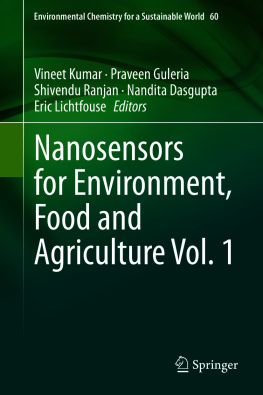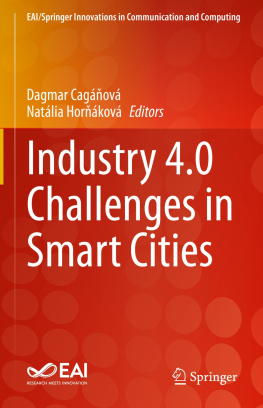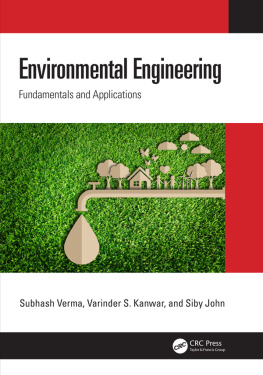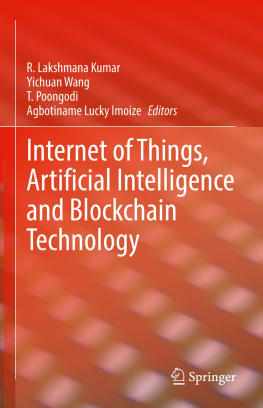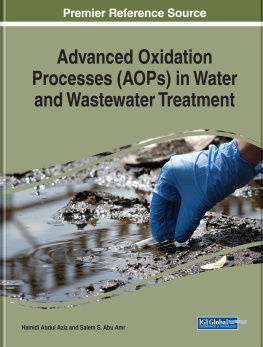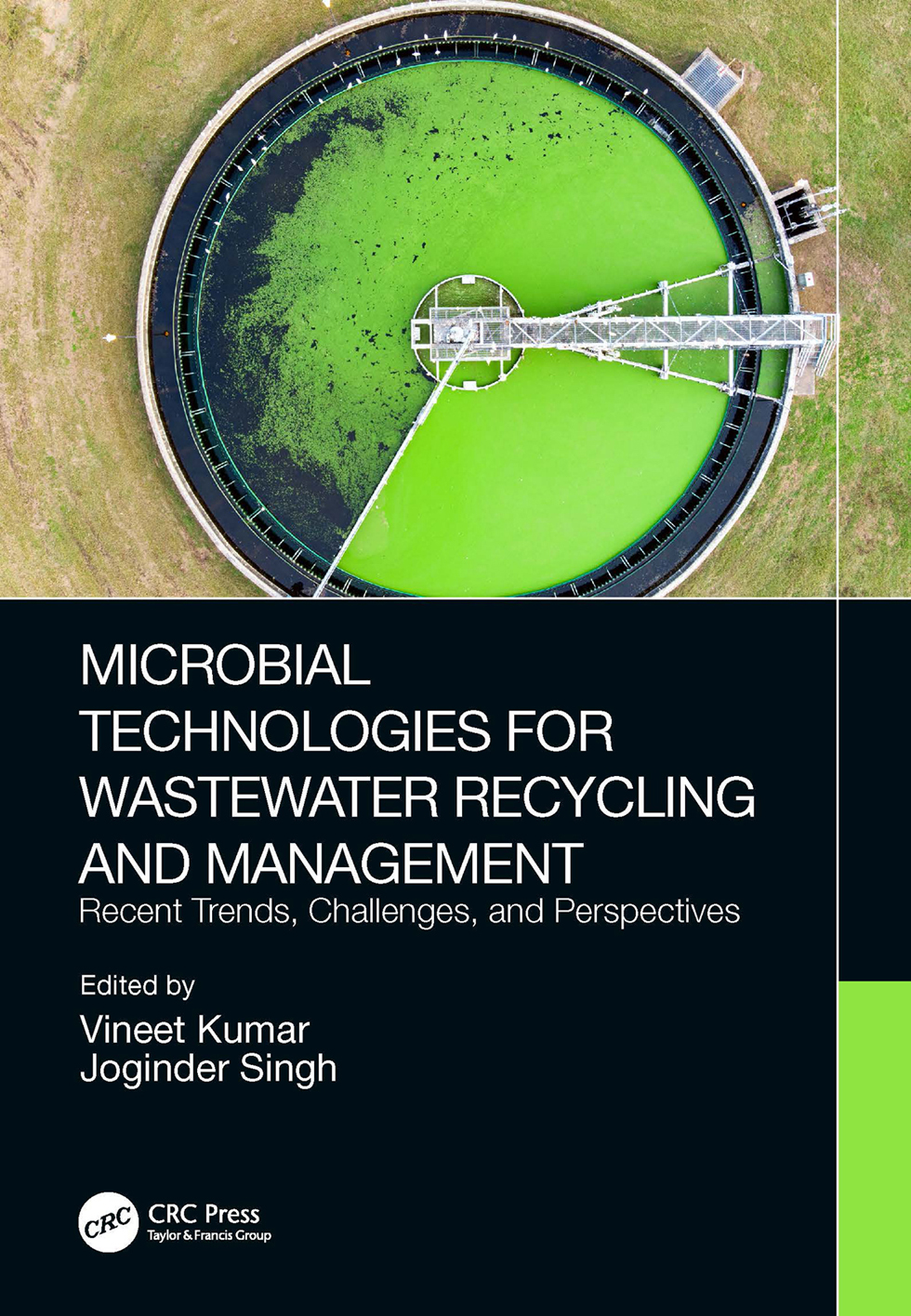
Microbial Technologies for Wastewater Recycling and Management
This book introduces the innovative and emerging microbial technologies for the treatment, recycling, and management of industrial, domestic, and municipal water and other wastewater in an environment-friendly and cost-effective manner. It discusses existing methods and technologies, up-gradation of existing technologies, and new technologies. It also highlights opportunities in the existing technologies along with industrial practices and real-life case studies.
Vineet Kumar
Department of Basic and Applied Sciences,
School of Engineering and Sciences,
G D Goenka University, Gurugram, Haryana, India
Joginder Singh
Department of Microbiology
School of Bioengineering and Biosciences,
Lovely Professional University, Phagwara, Punjab
Microbial Technologies for Wastewater Recycling and Management Recent Trends, Challenges, and Perspectives
Edited by
Vineet Kumar and Joginder Singh

Designed cover image: Shutterstock
First edition published 2023
by CRC Press
6000 Broken Sound Parkway NW, Suite 300, Boca Raton, FL 33487-2742
and by CRC Press
4 Park Square, Milton Park, Abingdon, Oxon, OX14 4RN
CRC Press is an imprint of Taylor & Francis Group, LLC
2023 selection and editorial matter, Vineet Kumar and Joginder Singh; individual chapters, the contributors
Reasonable efforts have been made to publish reliable data and information, but the author and publisher cannot assume responsibility for the validity of all materials or the consequences of their use. The authors and publishers have attempted to trace the copyright holders of all material reproduced in this publication and apologize to copyright holders if permission to publish in this form has not been obtained. If any copyright material has not been acknowledged please write and let us know so we may rectify in any future reprint.
Except as permitted under U.S. Copyright Law, no part of this book may be reprinted, reproduced, transmitted, or utilized in any form by any electronic, mechanical, or other means, now known or hereafter invented, including photocopying, microfilming, and recording, or in any information storage or retrieval system, without written permission from the publishers.
For permission to photocopy or use material electronically from this work, access
Trademark notice: Product or corporate names may be trademarks or registered trademarks and are used only for identification and explanation without intent to infringe.
ISBN: 9781032137582 (hbk)
ISBN: 9781032139715 (pbk)
ISBN: 9781003231738 (ebk)
DOI: 10.1201/9781003231738
Typeset in Times
by codeMantra
Dedicated to our teachers and mentors, from whom I continue to learn, and to my family for their support, blessings, motivation, and love.
Vineet Kumar
This book is dedicated to my children and my wife. Their patience and understanding have given me the time and inspiration to research and to edit this project.
Joginder Singh
Contents
Sugandha Mishra, Dhirendra Kumar, Rajesh Kumar Sharma, Amit Kumar Dutta, and Asha Sharma
Humaira Khanam, Tesnim Arfi, and Vinod Kumar Nigam
Kalp Bhusan Prajapati, Manoj Kumar, Neeraj Kumar Singh, and Rajesh Singh
Savita Durgappa Sandur and Shankramma Kalikeri
Thilagavathi Arumugham, Imran Ahmad, Norhayati Abdullah, Ali Yuzir, Iwamoto Koji, and Shaza Eva Mohamad
Sudipti Arora, Samvida Saxena, Vikky Sinha, Devanshi Sutaria, and Sakshi Saraswat
Amol Shukla, Satyendra, Pravin Manekar, Rima Biswas, Ritesh Vijay, and Sukdeb Pal
Sampurna Nandy, Deepak Panchal, Atya Kapley, and Sukdeb Pal
Sunayana Goswami and Suchismita Das
Shradhanjali Sethi, Bijaylaxmi Sahoo, Rima Biswas, and Rohan Gupta
Bishal Singh, Marpu Adilakshmi, and Evangeline Christina
Megha Shah and Anupama Shrivastav
Dhanya Mecherivalappil Subramanian and Sneh Lata
Jyoti Kaushal, Madhu Khatri, and Shailendra Kumar Arya
Sankha Chakrabortty, Indranil Saha, Jayato Nayak, and Ramesh Kumar
Prasenjit Chakraborty, Sankha Chakrabortty, Jayato Nayak, and Sujoy Chattaraj
Himanshu Tiwari and R.S. Singh
Divita Gautam and Praveen Dahiya
Heilyn Prez Soler, Jasiel Garca, and Myriam A. Amezcua-Allieri
Spriha Raven, Archana Tiwari, Lipi Rina, Aditya Francis, and Sashita Bindu Ekka
Mohit Aggarwal and Neelancherry Remya
Preface
The safe disposal of wastewater from different sectors such as municipal, domestic, and industrial activities has become a global threat due to its elevated content of organometallic materials, nutrients, pathogenic microorganisms, and many toxic and refractory chemical elements including heavy metals and endocrine-disrupting chemicals. Due to rampant industrialization, population, and urbanization, it is not possible to stop the discharge of wastewater into the ecosystem. Hence, adequate management and reclamation of wastewater streams for their recycling and reuse as well as resource recovery of value-added materials have become a priority of environmental engineers and biotechnologists for sustainable development. Although several conventional biological, physical, and physicochemical methods dealing with a wide array of chemicals discharged in wastewater have been suggested or tested widely by the scientific community, these treatment approaches are associated with high operational cost, excess use of chemicals, less effective decolorization rate, and a huge amount of toxic sludge generation with subsequent disposal problems. These methods only change the form of the problem and fail to remediate the pollutants from wastewater thoroughly. Therefore, sufficient treatment is essential before the wastewater is disposed into the open environment. In the current scenario, considerable research efforts in government institutions, industrial, and academic, have been looked at on the development of new and sustainable technology for the adequate reclamation and/or detoxification of chemical contaminants of wastewater discharged in wastewater that can recover and reuse wastewater for sustainable development. In recent years, microbial biotechnologies have introduced a myriad of novel microbes and/or their enzyme systems that can have promising outcomes in environmental clean-up and remediation. Microbe-based biotechnological methods offer clear advantages over traditional individuals methods for clean-up of wastewater. Research and development studies conducted around the globe established that microbial technologies play a promising role in the reclamation of wastewater contaminated with refractory organic, inorganic, and organometallic pollutants and enable them to be safely disposed into the environment without posing a serious danger to human and environmental health and subsequently recycle and reuse them for various applications. Hence, microbial technologies play a vital role in the development of a circular economy in wastewater recycling and management by integrating resource recovery and bioenergy generation for clean water production. Due to the increased importance of the latter and to the need of finding innovative, low-cost, low-energy, sustainable, and eco-friendly solutions for wastewater treatment, the proposed book is timely and appropriate. Editors' effort is to provide complete and advanced knowledge of wastewater reclamation, recycling, reuse and resource microbial recovery technologies available across the globe, which will be a boon for the concern broad range of readers and industry professionals to their minas of sustainable development for pollution prevention and economic growth of the country.
Next page

